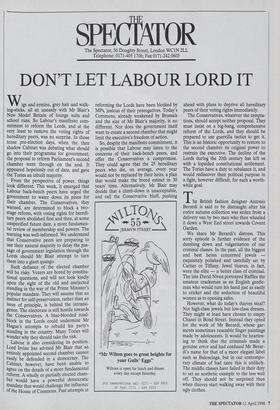SPECTAT THE OR
The Spectator, 56 Doughty Street, London WC1N 2LL Telephone: 0171-405 1706; Fax 0171-242 0603
DON'T LET LABOUR LORD IT
Wigs and ermine, grey hair and walk- ing-sticks, all sit uneasily with Mr Blair's New Model Britain of lounge suits and school runs, So Labour's manifesto com- mitment to reform the Lords, and at the very least to remove the voting rights of hereditary peers, was no surprise. In those tense pre-election days, when the then shadow Cabinet was debating what should go into their programme for government, the proposal to reform Parliament's second chamber went through on the nod. It appeared hopelessly out of date, and gave the Tories an inbuilt majority,
From the perspective of power, things look different. This week, it emerged that Labour back-bench peers have urged the government to water down its plans for their chamber. The Conservatives, they warned, are determined to block a two- stage reform, with voting rights for heredi- tary peers abolished first and then, at some unspecified future date, a more fundamen- tal review of membership and powers. The warning was well-informed. We understand that Conservative peers are preparing to use their natural majority to delay the pas- sage of government legislation through the Lords should Mr Blair attempt to turn them into a giant quango. Such defiance of the elected chamber will be risky. Voters are bored by constitu- tional questions, and will not look kindly upon the sight of the old and unelected standing in the way of the Prime Minister's popular mandate. They will assume that an instinct for self-preservation, rather than an issue of principle, is behind the intransi- gence. The electorate is still hostile towards the Conservatives. A blue-blooded road- block in the Lords could undermine Mr Hague's attempts to rebuild his party's standing in the country. Many Tories will wonder why they should take the risk. Labour is also considering its position. Lord Irvine has advised Mr Blair that an entirely appointed second chamber cannot easily be defended in a democracy. The Cabinet, however, have been unable to agree on the details of a more fundamental reform. A wholly or partially elected cham- ber would have a powerful democratic mandate that would challenge the influence of the House of Commons. Past attempts at reforming the Lords have been blocked by MPs, jealous of their prerogatives. Today's Commons, already weakened by Brussels and the size of Mr Blair's majority, is no different. Nor does the government itself want to create a second chamber that might limit the executive's freedom of action.
So, despite the manifesto commitment, it is possible that Labour may listen to the concerns of their back-bench peers, and offer the Conservatives a compromise. They could agree that the 25 hereditary peers who die, on average, every year would not be replaced by their heirs, a plan that would make the breed extinct in 30 years' time. Alternatively, Mr Blair may decide that a climb-down is unacceptable, and call the Conservative bluff, pushing ahead with plans to deprive all hereditary peers of their voting rights immediately.
The Conservatives, whatever the tempta- tions, should accept neither proposal. They must insist on a big-bang, comprehensive reform of the Lords, and they should be prepared to use guerrilla tactics to get it. This is an historic opportunity to restore to the second chamber its original power to restrain the executive. The decline of the Lords during the 20th century has left us with a lopsided constitutional settlement. The Tories have a duty to rebalance it, and would rediscover their political purpose in a fight, however difficult, for such a worth- while goal.
The British fashion designer Antonio Berardi is said to be distraught after his entire autumn collection was stolen from a delivery van by two men who then wheeled it down a West End street towards Covent Garden.
We share Mr Berardi's distress. This sorry episode is further evidence of the dumbing down and vulgarisation of our criminal classes. In the past, all the biggest and best heists concerned jewels exquisitely polished and tastefully set by Cartier or Tiffany. Jewel thieves, in fact, were the elite — a better class of criminal. The late David Niven portrayed Raffles the amateur cracksman as an English gentle- man who would turn his hand just as easily to cricket and the seduction of beautiful women as to opening safes.
However, what do today's thieves steal? Not high-class jewels but low-class dresses. They might at least have chosen to empty Chanel in Bond Street. Instead they opted for the work of Mr Berardi, whose gar- ments sometimes resemble finger paintings made by adolescents. It would be hearten- ing to think that the criminals made a genuine error and had confused Mr Berar- di's name for that of a more elegant label such as Balenciaga, but in our contempo- rary climate of bad taste this is unlikely. The middle classes have failed in their duty to set an aesthetic example to the less well off. They should not be surprised then when thieves start walking away with their ugly clothes.


































































 Previous page
Previous page